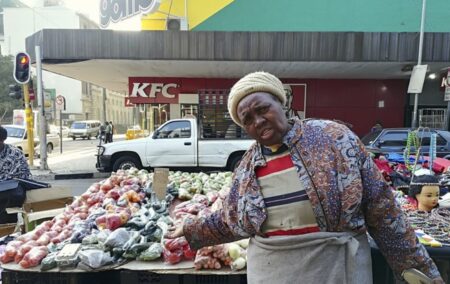It was reported recently that the Department of Employment and Labour’s Inspection and Enforcement Services (IES) branch has established a National Labour Inspection Task Team to target South Africa’s informal economy.
It was reported recently that the Department of Employment and Labour’s Inspection and Enforcement Services (IES) branch has established a National Labour Inspection Task Team to target South Africa’s informal economy.
The department’s Teboho Thejane said in a statement: ‘The Task Team, which is a team of inspectors from different provinces given the mandate to come up with directives that will be utilised to conduct researched inspections in the informal economy, was established last year (2022) and the first meeting of this unique project in Africa took place in June 2022.’
The economy is in free fall; inflation is creeping upwards; food inflation is skyrocketing and the labour department is using a form of overreach much loved by our defiantly socialist minister of labour, Thulas Nxesi, to immiserate the desperate even more.
Inspiration apparently ‘derived from the International Labour Organisation (ILO) recommendation 204 adopted by the International Labour Conference in June 2015’.
The labour department’s Principal Inspector: Occupational Health and Safety in Gauteng, Siphokazi Kope, said, ‘In light of the Labour Administration Convention, No.150 of 1978 and Recommendation No.204 respectively, there is a need to intervene in the informal economy and transition the Informal Economy into Formal Economy’.
You can rest assured that when he says ‘transition’ the informal economy into the formal economy he is not talking about giving traders a leg up to improve their ability to make a living and provide capital to move into the formal economy. No, no, no.
His concern is that ‘current South African labour laws are not adequately addressing employment conditions for workers in the Informal Economy sector. It is evident that workers in the Informal Economy Sector do not enjoy all the employment conditions or rights as those employed in the formal economy sector’.
No kidding! That’s why it is ‘the informal sector’: it’s a sector that evolves out of doing what needs to be done to survive, and, yes, there may be informal businesses that employ a whole lot of people and treat them worse than they should, but in our situation, this is not a priority for the Department of Employment and Labour (DEL). After all, it is burning the midnight oil to further annoy the formal sector with onerous BEE requirements.
Kope said this came out of a recent Employment Standards conference on the theme ‘Evolve, Pursue and Overtake’.
Let your imagination take flight over what that’s supposed to mean!
‘We have decided to take part and ensure that we are first of the African countries that have tried inspections in the informal economy. So we are having targets in that space just for the teams we are putting it as a project’, Advocate Fikiswa Bede – the Department of Employment and Labour’s Chief Director: Statutory and Advocacy Services – is quoted as saying.
Kope said the targeted informal economy inspections incorporated a pro-active and re-active approach to inspections.
‘This is a planned inspection initiated as a result of the Labour Centre, Provincial, National Inspection plan which is derived from the Annual Performance Plan (APP) to ensure compliance with employment law.
‘This is an inspection in response to a request for an inspection, complaint or a case in the informal economy’.
On the basis of giving a person the rope to hang himself, Kope said, ‘the term informal economy’ refers to all economic activities by workers and economic units that are – in law or in practice – not covered or insufficiently covered by formal arrangements.
‘Their activities are not included in the law, which means that they are operating outside the formal reach of the law; or they are not covered in practice, which means that – although they are operating within the formal reach of the law, the law is not applied or not enforced; or the law discourages compliance because it is inappropriate, burdensome, or imposes excessive costs to those who operate in the informal economy’.
Kope added: ‘Workers in the informal economy include both wage workers and own-account workers (Self-employed person). Most own-account workers are as insecure and vulnerable as wage workers and move from one situation to the other. Because they lack protection, rights and representation, these workers often remain trapped in poverty’.
So, if I understand it correctly, ‘own-account workers’ (better known and sufficiently well known as ‘self-employed’), are people who in the face of unemployment, have managed to find a way to earn a living, but by doing so they make themselves ‘insecure and vulnerable as wage workers…(who) lack protection, rights and representation..’. In other words they have to be saved from themselves.
And whose fault is that, labour minister and commissar supreme Thulas Nxesi? Once again a government department serves the people … by making them poorer, and more miserable.
Last week’s announcement at SONA that a ‘minister of electricity’ is to appointed brought to mind one of Monty Python’s sillier sketches involving a ‘ministry of silly walks’. Maybe we now have a ‘ministry of silly walk-abouts’.
[Photo: Zoe Postman for Groundup]

